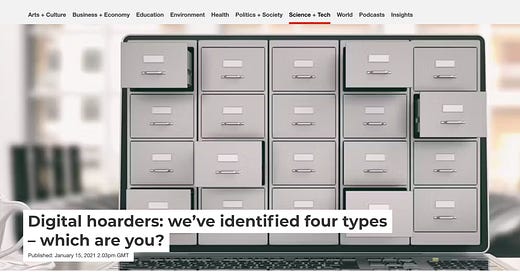Don't Let Email Ruin Your Life
Teacher Tapp asks interesting questions of some 10,000 teachers, and I look forward to their weekly results.
What teachers think is often a surprise to me - and surprises are always when I learn something new.
The other gift it brings is a blog - every day we get to read what someone on the team thinks is a great idea - like browsing the staff recommendations in Waterstones. Today’s is about email habits.
The assumption is that if your emails aren’t organised into folders, and you are storing old emails, you are a hoarder.
And, as a hoarder, you have a psychological issue.
And if you are in denial about that issue, then you need to think about data protection and GDPR - someone may access your email and plunder it for riches and contraband.
And failing that, some server is murdering and cremating trees just so you can hoard your emails, you selfish climate change denier.
Allow me to offer a counterargument …
You Are a Teacher
Sally taught me this.
Remember paper? It’s what we used to use before email. Email = paper.
This is what Sally said. Keep a pile of paper on your desk. It is everything that comes into your pigeon hole which you can’t instantly throw away.
Act on the stuff you know is urgent. But the other stuff stays in the pile.
If you have to look at a piece of paper again, keep it at the top of the pile. At the end of each of the 3 big terms, bin every piece of paper you haven’t looked at again. Simple.
What does this do?
It means all the rubbish is thrown away instantly.
It means the urgent stuff is dealt with immediately.
It means you never lose anything important, and it takes very little time to find it.
But it also means this.
You have zero anxiety. You waste almost no time on paper and filing, and you can devote much more time and energy to teaching.
Email is the same as paper
I didn’t check my pile of paper in lessons or before school. I added to my pile at lunch or after school, when I visited my pigeon hole. Emails should be checked only at these times (or 2 which are most convenient to you).
I rarely took a piece of paper home!
If it is urgent, someone will find you. No one emails ‘fire’ as a fire alarm.
If I could tell at a glance that it was not an important piece of paper, it filled the bin in the staffroom. These are emails you can delete just by glancing at the subject line - tick, tick, tick without opening, and delete.
I didn’t waste time filing. I had some binders for things I would need to look at again - in email terms, this is an attachment. Download the attachments you need - then get rid of the email.
The termly paper pile never grew too large - not so tall that it fell off my desk. It would horrify many teachers - those who are anxious, of which there are so many in our schools.
Only one thing makes me anxious - not being a good teacher.
Everything else is either a necessary distraction - deadlines, Ofsted, assessment, safeguarding - or an unnecessary distraction - most paper or email.
If you can sift between what makes you a great teacher, and what doesn’t, emails sitting in your inbox will cause you zero stress.
(Jackson hasn’t turned up to his geography lesson - I don’t need to know - I’m explaining something or walking the room looking for effort, students thinking hard and revealing misconceptions.
If you want to stop teachers doing their job, tie them to a computer where they can deal with ‘urgent’ emails instead of making students learn).
One Final Advantage
At some point, a piece of paper in your pile will prove to be important, even though you’ve not looked at it again.
That is what the pile is for.
You can search your pile of emails far more quickly - a key word will do it. Having emails in folders might save you some seconds in a search. But the cumulative minutes or hours spent filing them in folders will never be repaid.
Do not file. Keep a termly pile.
Be free.
Go forth and teach.
But thanks to Pete!@pete-clever.bsky.social who has recommended this Substack on Bluesky - much appreciated.




